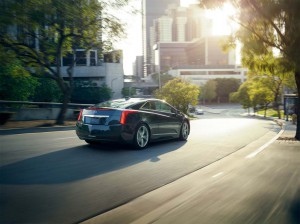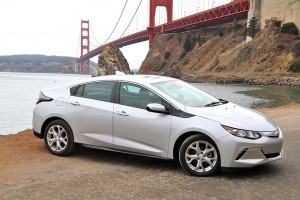If you’re determined to drive something green that has plenty of luxury touches but a price tag significantly less than that of a Tesla, you might want to head over to your local Cadillac dealer.
The luxury maker quietly pulled the plug on the ELR, a high-line version of the Chevrolet Volt, due a decidedly weak response by American motorists. Though the Caddy plug-in hybrid has been out of production since March, “a very small quantity…remains available at dealers,” Cadillac spokesman Dave Caldwell told TheDetroitBureau.com.
Launched with high expectations just two years ago, the Cadillac ELR never seemed to charge up the market. Originally priced at $76,000, or nearly double that of a Volt, Caddy tried a number of tricks to build momentum including about $11,000 in price cuts.
But dealers moved only 1,024 ELRs last year, or barely 7% of the total for the Chevy Volt. Through April of this year, sales of the luxury plug-in dipped to a meager 357, or barely one per Caddy dealer.
(Honda will offer battery version of the new Clarity, too. Click Here for the story.)
Though the ELR initially generated positive reviews for its exterior styling and interior refinement, critics came up with plenty of reason to steer clear. Range, in battery mode, was minimal, and while the battery-based coupe was quicker than the first-generation Volt, it was still slow off the line. For not much more money, buyers could opt for an all-electric Tesla Model S with better range and performance.
Cadillac officials signaled the ELR was in trouble when they revealed there were no plans to update the luxury plug-in, even as the Chevrolet Volt moved to a second-generation design yielding better mileage, improved performance and a roomier interior now capable of seating five adults.
“I plan to continue admiring it as one of the most beautiful cars on four wheels but we don’t plan further investment,” said Cadillac President Johan de Nysschen, who never seemed enamored of the ELR which he inherited from his predecessor after taking over the brand two years ago.
Not so coincidentally, de Nysschen cancelled another electric vehicle program in his previous job as CEO of Nissan’s own luxury brand Infiniti. He halted development on a high-line version of the Nissan Leaf over many of the same concerns that sank the Cadillac ELR, including limited range and a high price tag.
It’s not that the South African-born executive isn’t interested in battery-power. De Nysschen has given his blessing to a plug-in hybrid version of the new Cadillac CT6, the brand’s new flagship sedan. That PHEV is expected to market in late 2017 or early 2018, but it is primarily being aimed at the Chinese market where government officials are putting the thumb on the auto industry to adopt green powertrain technology to help address the country’s endemic air pollution problems.
(EV industry expected to hit nearly $60 billion by 2021. For more, Click Here.)
For that reason, the plug-in version of the CT6 will be built in China and imported into the U.S.
Late last year, de Nysschen told TheDetroitBureau.com that Cadillac will roll out plug-in versions of most of its new models by 2020. The exception will be the new XT5 sport-utility vehicle, the replacement for the old SRX that is just coming to market.
Luxury makers, in general, are rushing to market with new plug-in models, Mercedes-Benz, for example, planning to have 10 PHEVs in its line-up by 2017.
There are several reasons for this surge, including the demands of China’s bureaucrats. Plug-ins also help meet tough new emissions and mileage standards in the U.S., Europe and other parts of the world. Meanwhile, a number of major cities, including London and Paris, are given serious consideration to banning all but zero-emissions vehicles from driving within their urban cores. Plug-ins would bypass those restrictions while operating in battery mode.
(Click Here to see how a new Israeli battery company hopes tosolve one of the biggest gripes about EVs.)




Its a miracle that they even sold 1.
$76,000.00 for something that doesn’t have the range of a Vespa Scooter. Does anyone remember the Cadillac Cimmaron?? Somebody needs to fired to even think this would sell.
The total range of the ELR is 340 miles a Vespa has a tank of about 2.3 gallons it ain’t getting 340 miles per tank. The problem was selling the ELR the problem overpriced. GM should have waited until battery and production costs were low enough to bring it to the showroom floor at 40K. They wasted a really beautiful design and package. The Cimmaron was crap the ELR…not so much. No comparison at all.